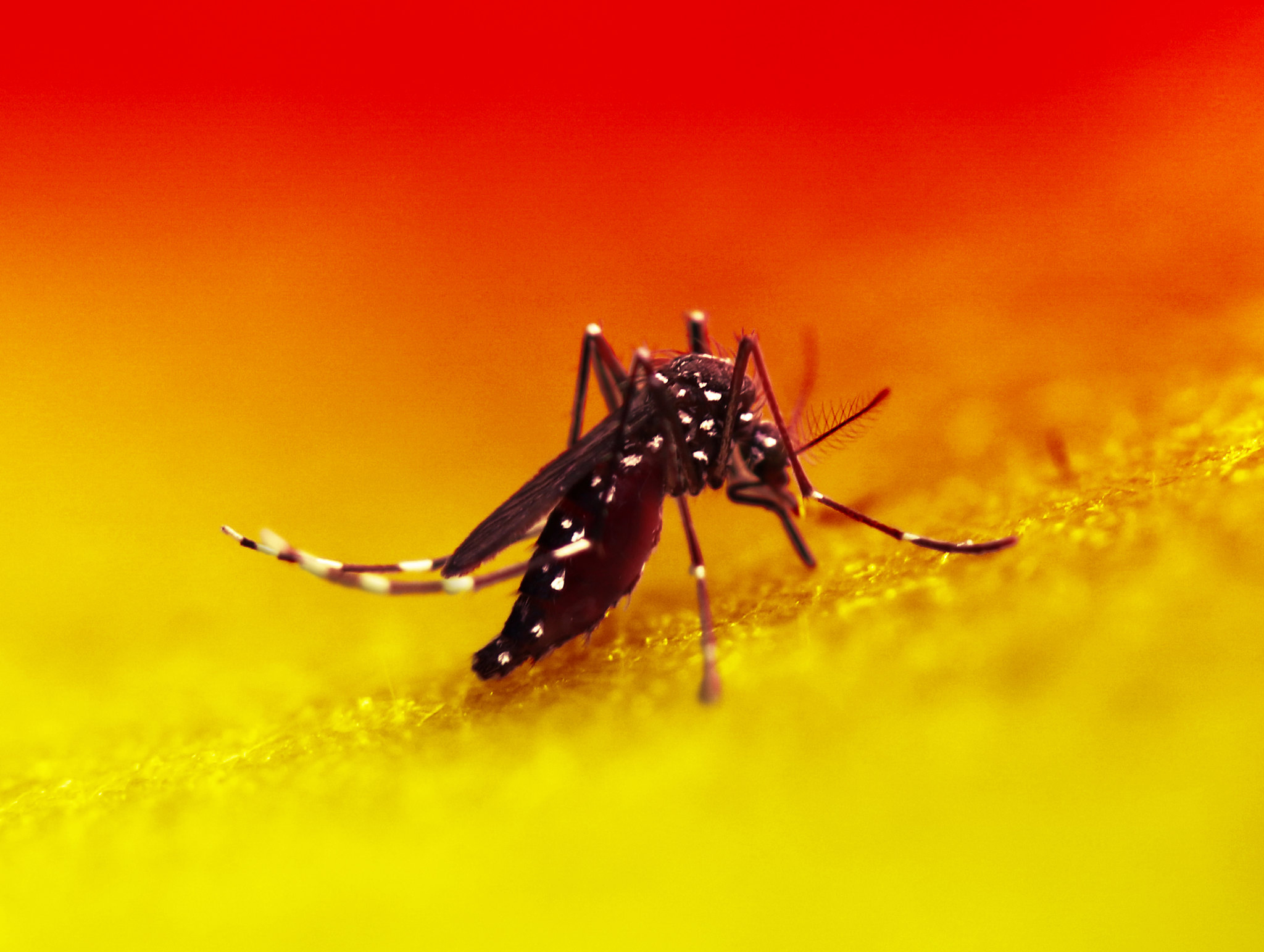
Press release
Tuesday February 11, 2025

Colorized image of an Aedes mosquito. This species can transmit multiple diseases.NIAID
A clinical trial supported by the National Institutes of Health (NIH) is testing an experimental treatment designed to help people suffering from the effects of dengue fever, a mosquito-borne viral disease. The study is supported by the NIH's National Institute of Allergy and Infectious Diseases (NIAID) and will involve exposing adult volunteers to a weakened strain of the dengue virus that causes a mild form of the disease and giving the experimental treatment at different doses to assess its safety and ability to alleviate symptoms.
Dengue fever is transmitted by Aedes mosquitoes. infected and sickens up to 400 million people each year, primarily in tropical and subtropical regions of the world, according to the U.S. Centers for Disease Control and Prevention. In 2024, dengue cases reached record levels in the Americas, with local transmission in the United States reported in Arizona, California, Florida, Hawaii, and Texas. Dengue is endemic in Puerto Rico, which reported nearly 1,500 cases last year. Most people with dengue fever do not develop symptoms, but those who do develop symptoms typically experience severe headache and body aches, nausea and vomiting, fever, and rash. One in 20 people who contract dengue fever develop severe illness, which can lead to shock, internal bleeding, and death. There is currently no Food and Drug Administration-approved treatment for dengue fever. “When caring for a patient who is seriously ill with dengue fever, health care providers have few options other than to provide supportive care,” said NIAID Director Jeanne Marrazzo, MD, MPH. “We must find safe and effective therapies to provide much-needed relief to people suffering from dengue.”
The new clinical trial will test the ability of AV-1, an investigational human monoclonal antibody developed by AbViro (Bethesda, Md.), to alleviate clinical symptoms when administered before and after dengue virus infection. Results from a Phase 1 trial supported by NIAID
indicated that AV-1 is safe for humans, which forms the basis of the new clinical trial to test its safety and effectiveness. The Phase 2 clinical trial will enroll at least 84 healthy adult volunteers at two sites: the Johns Hopkins Bloomberg School of Public Health Immunization Research Center in Baltimore and the University of Vermont Vaccine Testing Center in Burlington. After an initial screening and physical examination, volunteers will be randomly assigned to one of two groups. One group will receive AV-1 one day before being challenged with a mild strain of dengue virus, and the other will receive AV-1 four days after being challenged with dengue virus. Each group will be subdivided to receive 100 mg, 300 mg, or 900 mg of AV-1, administered as an intravenous infusion over 60 minutes. At each of the three dose levels, 12 participants will receive the investigational monoclonal antibody and two will receive a placebo. Before or after AV-1 is given, each volunteer will receive an injection of attenuated (weakened) dengue virus. In previous studies using this challenge virus, most volunteers developed a rash, and some had other mild symptoms of dengue, such as joint and muscle pain or headache. None of the volunteers developed dengue fever or severe dengue fever.
Volunteers will have regular follow-up visits with study staff for at least 155 days to carefully monitor the effects of the experimental monoclonal antibody. Using physical exams, diary records, and blood samples, researchers will document how the volunteers’ immune systems respond to dengue virus challenge, how quickly the virus clears from their bloodstream, and any symptoms they may experience. Researchers will use this information to determine how AV-1 affects volunteers’ ability to recover from dengue fever compared with placebo and to determine dosages at which AV-1 may be effective.
If AV-1 shows promising results in this clinical trial, researchers will be able to continue clinical evaluations of its safety and efficacy against dengue virus. For more information about the study, visit
ClinicalTrials.gov
and search for the identifier NCT05048875 . NIAID conducts and supports research—at NIH, throughout the United States, and around the world—to study the causes of infectious and immune-mediated diseases and to develop better ways to prevent, diagnose, and treat these diseases. NIAID news releases, fact sheets, and other materials are available atNIAID website
. About the National Institutes of Health (NIH):NIH, the nation's medical research agency, comprises 27 institutes and centers and is a component of the U.S. Department of Health and Human Services. NIH is the primary federal agency that conducts and supports basic, clinical, and translational medical research. It studies the causes, treatments, and cures for common and rare diseases. For more information about NIH and its programs, visit
www.nih.gov . NIH…Transforming Discovery into Health®
###
